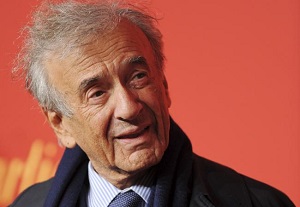In memoriam Elie Wiesel
De Amerikaans Joodse schrijver en Holocaust-overlevende Elie Wiesel is op 87-jarige leeftijd overleden. Elie Wiesel werd geboren op 30 september 1928 in Sighet (nu Sighetu Marmaţiei), Roemenië. Zie ook mijn blog van 30 september 2010 en eveneens alle tags voor Elie Wiesel op dit blog.
Uit: Night
“There are no Kabbalists in Sighet,” my father would often tell me.
He wanted to drive the idea of studying Kabbalah from my mind. In vain. I succeeded on my own in finding a master for myself in the person of Moishe the Beadle.
He had watched me one day as I prayed at dusk.
“Why do you cry when you pray?” he asked, as though he knew me well.
“I don’t know,” I answered, troubled.
I had never asked myself that question. I cried because … because something inside me felt the need to cry. That was all I knew.
“Why do you pray?” he asked after a moment.
Why did I pray? Strange question. Why did I live? Why did I breathe?
“I don’t know,” I told him, even more troubled and ill at ease. “I don’t know.”
From that day on, I saw him often. He explained to me, withgreat emphasis, that every question possessed a power that was lost in the answer …
Man comes closer to God through the questions he asks Him, he liked to say. Therein lies true dialogue. Man asks and God replies. But we don’t understand His replies. We cannot understand them. Because they dwell in the depths of our souls and remain there until we die. The real answers, Eliezer, you will find only within yourself.
“And why do you pray, Moishe?” I asked him.
“I pray to the God within me for the strength to ask Him the real questions.”
We spoke that way almost every evening, remaining in the synagogue long after all the faithful had gone, sitting in the semidarkness where only a few half-burnt candles provided a flickering light.
One evening, I told him how unhappy I was not to be able to find in Sighet a master to teach me the Zohar, the Kabbalistic works, the secrets of Jewish mysticism. He smiled indulgently. After a long silence, he said, “There are a thousand and one gates allowing entry into the orchard of mystical truth. Every human being has his own gate. He must not err and wish to enter the orchard through a gate other than his own. That would present a danger not only for the one entering but also for those who are already inside.”
And Moishe the Beadle, the poorest of the poor of Sighet, spoke to me for hours on end about the Kabbalah’s revelations and its mysteries. Thus began my initiation. Together we would read, over and over again, the same page of the Zohar. Not to learn it by heart but to discover within the very essence of divinity.
And in the course of those evenings I became convinced that Moishe the Beadle would help me enter eternity, into that time when question and answer would become ONE.”

